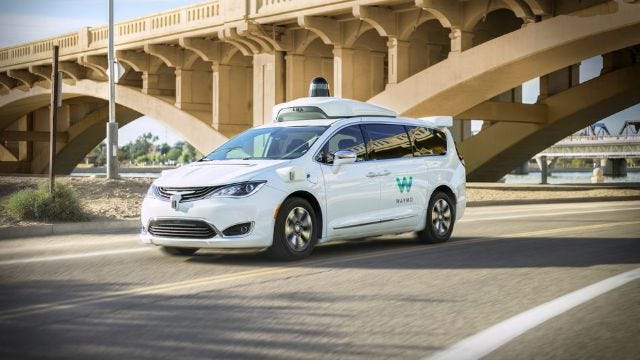Issue #212 - biohackers trying to upgrade human body; why tech companies are snatching neuroscientists studying animal brains; Jibo's ongoing death
View this email in your browser
This week - biohackers trying to upgrade human body; why tech companies are snatching neuroscientists studying animal brains; the ongoing death of Jibo and its impact; Waymo teams up with Renault and Nissan; and more!
MORE THAN A HUMAN
How biohackers are trying to upgrade their brains, their bodies — and human nature

This article answers 9 questions about biohacking, from what it is and why would people want to modify their bodies to the relationship between science and biohacking to the questions about legality and morality of biohacking.
Science Leaders: We Can’t Stop Russian’s Plan for CRISPR Babies
Inspired by the controversial experiment conducted by He Jiankui last year, Denis Rebrikov announced recently that he hopes to create his own CRISPR babies, possibly before the end of 2019 — and now leaders within the global science community are saying there’s nothing they can do to stop him.
Electronic ‘tattoo’ monitors heart for days
Researchers have created a heart monitor made from a stretchy, lightweight material that can be worn and can remain over the heart for extended periods with little or no discomfort. The device measures cardiac health in two ways, taking electrocardiograph and seismocardiograph readings simultaneously.
How to live forever: meet the extreme life-extensionists
Some sleep on electromagnetic mats, others pop up to 150 pills a day. But are ‘life extensionists’ any closer to finding the key to longevity? Alex Moshakis meets some of the people determined to become immortal and explores the world of scientists and businessmen trying to extend their lives.
► Isaac Arthur: Superpowers (23:20)
The dream of having superhuman abilities is as old as humanity, and appeared in everything from mythology to comic books, but the future might offer technologies that turn these dreams into reality. Isaac Arthur explore some of those options, from superstrength and speed to options like telepathy.
Noninvasive system lets people ‘mind control’ robot arm
Using a noninvasive brain-computer interface, researchers have developed the first-ever successful mind-controlled robotic arm with the ability to continuously and smoothly track and follow a computer cursor.
ARTIFICIAL INTELLIGENCE
Apple, Google, and Facebook Are Raiding Animal Research Labs

It would be hard to believe a couple of years ago that studying how birds, mice, and fish brains work can lead to seven-figure salaries at top tech companies to help advance artificial intelligence, self-driving cars, and more.
ROBOTICS
Waymo Goes Global With Renault-Nissan Partnership

Waymo has signed an agreement to work with Renault and Nissan on issues surrounding self-driving car technology. The partnership, which the companies call a “first step,” doesn’t currently include immediate plans to launch Waymo self-driving vehicles in France or Japan. Instead, the companies will work together to “research commercial, legal and regulatory issues related to driverless transportation-as-a-service offerings in France and Japan,” according to a joint press release.
They welcomed a robot into their family, now they’re mourning its death
The ongoing shutdown of Jibo's servers is an interesting study of human-robot interactions. Some people (like those featured in this article) created an emotional connection with the robot and prepare for the imminent "death" of their beloved robots.
Death by algorithm: the age of killer robots is closer than you think
Experts in machine learning and military technology say it would be technologically straightforward to build robots that make decisions about whom to target and kill without a “human in the loop” — that is, with no person involved at any point between identifying a target and killing them. “Technologically, autonomous weapons are easier than self-driving cars,” says Stuart Russell, a computer science professor at UC Berkeley and leading AI researcher. “People who work in the related technologies think it’d be relatively easy to put together a very effective weapon in less than two years.”
A complete list of all the ROS-enabled cobots
I'm bringing this list to highlight how many projects are there working on collaborative robots, also known as cobots. Those robots are designed to cooperate with a human and help perform any tasks.
Amazon gets U.S. patent to use delivery drones for surveillance service
Amazon.com Inc is exploring using drones not just to deliver packages but also to provide surveillance as a service to its customers, according to a patent granted by the United States Patent and Trademark Office. The delivery drones can be used to record video of consented user’s property to gather data that can be analyzed to look out, say for example, a broken window, or a fire or if a garage door was left open during the day, the patent described.
BIOTECHNOLOGY
Biothreats, Real and Imagined
Whenever synthetic biology is being brought up, someone will paint a grim picture where someone assembles a new killer bug in their basement and releases it. Emily Leproust, CEO of Twist Bioscience, writes this is an unlikely scenario and instead of bioterrorism we should focus on threats that come from nature, like new viruses that are out there but we don't know about them yet.
CRISPR opens door to new type of medicine—'genome surgery'
Recent advances in genetic engineering open a possibility of "genome surgery"—the precision targeting of genetic defects in the genome, using CRISPR-Cas9 customized to individual patients. Such "bespoke" therapies can benefit small groups of individuals or families with particular genetic defects that would never be addressed by large pharmaceutical companies.
Thank you for subscribing,
Conrad Gray (@conradthegray)
If you have any questions or suggestions, just reply to this email or tweet at @hplusweekly. I'd like to hear what do you think about H+ Weekly.
Follow H+ Weekly!


